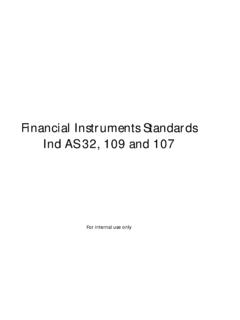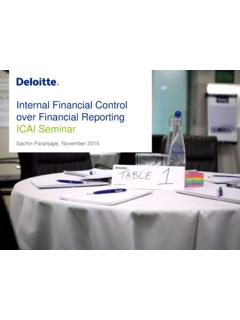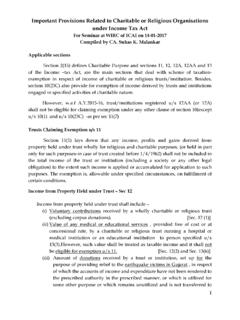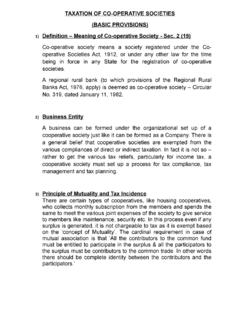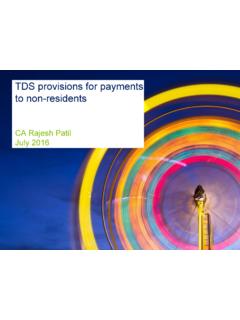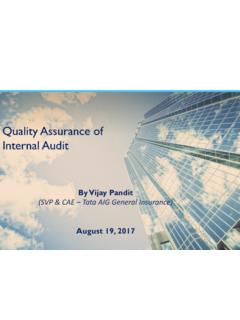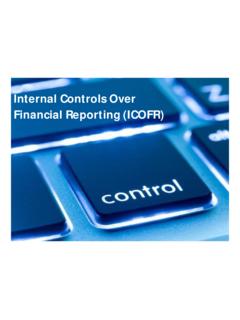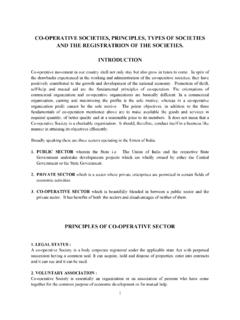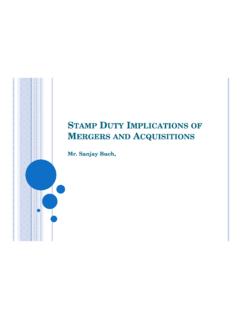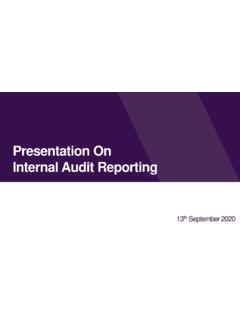Transcription of BASICS OF GST - WIRC-ICAI
1 Partners: CA Arvind Saraf CA Ritu Agarwal CA Atul Mehta BASICS OF GST Presented By Index Basic Concepts Dual Model Important Definitions Concept of Supply - Schedule I, II & III Levy & Composition Exemption from Tax Reverse Charge Mechanism Basic Concepts GST is India s biggest tax reform in 60years. It is an Act one if its kind and whereas many countries across the world have adopted this Act. India, with its wide diversity, has adopted this much talked about act in its unique way. India has excellently converged the One Nation One Tax slogan with the diverse nature of transactions and inequalities that exist in our nation. GST Act is centrally governed by a GST Council which is represented by the Finance Minister and representatives of all other States. GST Council shall be responsible for all major decisions regarding the act. GST Act is the result of great effort of a tri-way partnership between Government, Professionals and Business Sector.
2 VIEWS ON GST BY A FEW LEARNED PEOPLE Salient Features 1. One Tax for Manufacturing,Trading & Service 2. Reduction in Cascading Effect 3. Inverted Duty Structure Resolved to a great extent 4. More Revenue to government + Lower Burden on Existing Tax payers : Both are possible 5. Multiple registrations 6. Different points of taxation 7. Online Matching of All Invoices 8. Uniformity among States Salient Features 9. Goods Vs Service Dilemma NO MORE!! 10. Overall Reduction in Prices 11. Common National Market 12. Self regulatory System 13. Simplified Tax Regime 14. Consumption Based Tax 15. Abolition of CST 16. Boost for Make in India IGST on Imports at full rate 17. HSN Code Based Classification Present Regime vs. GST Regime. GST vs VAT Comparison Present Regime GST Regime Broad scheme Separate laws for Separate levy Only one law Tax rates Different for different states.
3 Uniform across all States Cascading effect Exists due to credit of CST Eliminated in GST Compliance Complex Easier Transparent Tax Administration Less Transparent More Transparent Important Definitions The term GST is defined in Article 366 (12A) to mean any tax on supply of goods or services or both except taxes on supply of the alcoholic liquor for human consumption . Definition of Supply supply includes all forms of supply of goods and/or services such as sale, transfer, barter, exchange, licence, rental and lease made or agreed to be made for a consideration by a person in the course or furtherance of business, (b) importation of service, for a consideration whether or not in the course or furtherance of business. Important Definitions Definition of Goods goods means every kind of movable property other than money and securities but including actionable claim, growing crops, grass and things attached to or forming part of the land which are agreed to be severed before supply or under the contract of supply; Actionable Claim of only Lottery, Gambling or betting shall be treated as Supply Intangible Assets like DEPB License to be treated as Goods Definition of Services In terms of Section 2(102) Services means anything other than goods, money and securities.
4 Definition of AGGREGATE TURNOVER turnover means the aggregate value of all taxable and non-taxable supplies, exempt supplies and exports, of goods and/or services, to be computed on all India basis and excludes taxes, if any, charged under this Act; (Imp for: HSN, Composition, Liability to Register, etc) Definition of Job Work job work means any treatment or process undertaken by a person on goods belonging to another registered person and the expression job worker shall be construed accordingly. Thus Job work means undertaking any treatment or process by a person on goods belonging to another registered taxable person. The person who is treating or processing the goods belonging to other person is called job worker and the person to whom the goods belong is called principal . Definition of Business a)any trade, commerce, manufacture, profession, vocation or any other similar activity, whether or not it is for a pecuniary benefit; b)any transaction in connection with or incidental or ancillary to (a) above; c) any transaction in the nature of (a) above, whether or not there is volume, frequency, continuity or regularity of such transaction; d)supply or acquisition of goods including capital assets and services in connection with commencement or closure of business; e)provision by a club, association, society, or any such body (for a subscription or any other consideration) of the facilities or benefits to its members as the case may be; f)admission, for a consideration, of persons to any premises; and g)services supplied by a person as the holder of an office which has been accepted by him in the course or furtherance of his trade, profession or vocation; but does not include agriculture.
5 Definition of Business Excise / Service tax laws do not define the term business . However, it is defined under the CST Act / State VAT laws. The definition in the GST law is a modified version of the definition under CST / VAT laws, in as much as the scope is substantially expanded to include among others wager, profession and vocation. This definition is very wide and covers all the transactions that are currently subjected to various taxes that are being subsumed in the GST Laws. This definition assumes significance as the proposed levy is on supplies undertaken in the course or furtherance of business. Important: Clause (g) may require understanding of employment as differentiated from profession. For instance, if a CA in practice provides CFO or Independent Director services, the service Provided by him may be treated as business and not employment . Definition of Business Vertical business vertical means a distinguishable component of an enterprise that is engaged in supplying an individual product or service or a group of related products or services and that is subject to risks and returns that are different from those of other business verticals; Explanation: Factors that should be considered in determining whether products or services are related include: (a) the nature of the products or services; (b) the nature of the production processes; (c) the type or class of customers for the products or services; (d) the methods used to distribute the products or provide the services; and (e) if applicable, the nature of the regulatory environment, for example, banking, insurance, or public utilities.
6 Meaning of Furtherance of Business under GST: Is the activity, a serious undertaking earnestly pursued? Is the activity is pursued with reasonable or recognizable continuity? Is the activity conducted in a regular manner based on sound and recognized business principles? Is the activity predominantly concerned with the making of taxable supply for consideration/ profit motive? The test may ensure that occasional supplies, even if made for consideration, will not be subjected to GST. For example: An Individual buys car for personal use and sell the same after 1 year to car dealer this is not a sale under GST No furtherance of business. A Dealer of AC transfer 1 AC from his stock at his residence for personal use without consideration shall be treated as supply. Provision of Supply of goods or services by a society club trust etc to its member shall be treated as supply. Transfer of right to use goods shall be treated as supply of service because there is no transfer of title in such supplies.
7 Such transactions are specifically treated as supply of service in Schedule-II of MGL. Works contract and catering services shall be treated as supply of service as specified in Schedule-II of MGL. Supply of goods on hire purchase shall be treated as supply of goods as there is transfer of title, albeit at a future date. Who is Liable to get Registered under GST? Must register GST Are you liable to register for GST? GST registration is mandatory for- Any business whose turnover in a financial year exceeds Rs 20 lakhs (Rs 10 lakhs for North Eastern and hill states). [Note: If your turnover is supply of only exempted goods/services which are exempt under GST, this clause does not apply.] Every person who is registered under an earlier law ( , Excise, VAT, Service Tax etc.) needs to register under GST, too. When a business which is registered has been transferred to someone/demerged, the transferee shall take registration with effect from date of transfer.
8 Anyone who deales in inter-state supply of goods Casual taxable person Non-Resident taxable person Agents of a supplier Those paying tax under the reverse charge mechanism Input service distributor E-commerce operator or aggregator Person who supplies via e-commerce aggregator Person supplying online information and database access or retrieval services from a place outside India to a person in India, other than a registered taxable person A person who occasionally supplies goods and/or services in a territory where GST is applicable but he does not have a fixed place of business. Such a person will be treated as a casual taxable person as per GST. Example: A person who has place of business in Bangalore supplies taxable consulting services in Pune where he has no place of business would be treated as casual taxable person in Pune. Who is a Casual Taxable Person? Special registration for casual taxable person and non-resident taxable person (section 24) A casual taxable person or a non-resident taxable person shall apply for registration at least five days prior to the commencement of business.
9 Section 24 provides for special provisions relating to casual taxable person and non resident under GST. Casual/non-resident taxable person may obtain a temporary registration for a period of 90 days (extendable for additional 90 days). A person who obtains registration u/s 24, will be required to make advance deposit of GST (based on his estimated tax liability). TYPES OF GST THERE ARE FOUR TYPES OF GST: Central Goods and Service Tax (CGST) State Goods and Service Tax (SGST), Union Territory Goods and Service Tax (UTGST) Integrated Goods and Service Tax (IGST) Central Goods and Service Tax (CGST) CGST is a tax on all intra-State (within the same state) supplies of goods or services or both. The amount of CGST will go to Central Government. State Goods and Service Tax (SGST) SGST is a tax on all intra-State (within the same state) supplies of goods or services or both. The amount of CGST will go to State Government.
10 Integrated Goods and Service Tax (IGST) IGST is a Tax on inter-state (outside state) supply of goods and services, Integrated GST (IGST) will be collected by Centre. IGST will also apply on imports Illustrations Supply Supplier Place of Supply Result Goods Karnataka Tamil Nadu Inter-State (IGST) Services Pondicherry Kerala Inter-State (IGST) Goods Chandigarh* Chandigarh* Inter-State (IGST) Services Chandigarh* Punjab Inter-State (IGST) Goods Punjab Chandigarh* Inter-State (IGST) Goods delhi delhi Intra-State (CGST/SGST) Services Rajasthan Rajasthan Intra-State (CGST/SGST) Note: Chandigarh is a UT without Legislature; Explanation to Section 2(2) provides that the term State includes a UT with Legislature (Of the 7 UTs, delhi and Pondicherry are the only 2 UTs with Legislature). In case of a Union Territory if it adopts the legislature of a particular State say Punjab, then it will be intra-State supply. GST [say 18%] Intra-State (within state) Transactions CGST [9%] SGST/UTGST [9%] Inter-State (outside state) Transactions IGST [18%] TAXES SUBSUMED/ TAXES THAT SHALL STAY: CGST Central Excise Duty Service Tax Additional Excise Duties Countervailing Duties Cesses SGST Value Added Tax / CST Entertainment Duty Octroi and Entry Tax Purchase Tax Luxury Tax Taxes Not Subsumed State Excise Duty Stamp Duty Profession Tax Electricity Duty Basic Custom Duty Due to GST, there is an abolishment of 17 taxes and 22 cesses.
